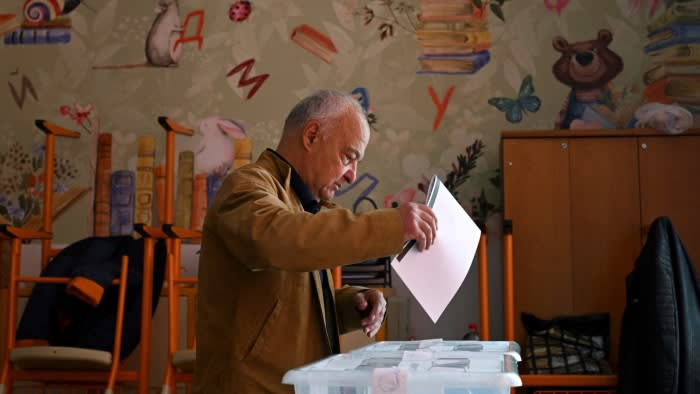Unlock the Editor’s Digest for free
Roula Khalaf, Editor of the FT, selects her favourite stories in this weekly newsletter.
Bulgaria’s seventh parliamentary election in less than four years appears to have failed to unblock a political impasse that has left the country without a stable government since 2020.
The centre-right Gerb party of former premier Boyko Borisov remains the biggest, according to exit polls on Sunday, but, with only a projected 25-26 per cent share of the vote, it again fell short of an overall majority.
The projected result is broadly in line with opinion polls and is little changed from Gerb’s tally in several recent elections, all of which ended without a stable governing majority in parliament.
Gerb’s rivals, the liberal former ruling party We Continue the Change (PP), received around 15 per cent, while the pro-Russian nationalist party Revival won 13 per cent. Gerb would almost certainly be unable to cobble together a coalition with either party, analysts said.
Smaller anti-establishment, pro-Russian forces had sought to benefit from voter fatigue after so many inconclusive polls and doubts about democratic legitimacy. However, turnout ended up being slightly higher than in previous polls, with a little over a third of the electorate voting.
“This result is less terrible than some of us may have thought,” said Vessela Tcherneva, an analyst at the European Council on Foreign Relations in Sofia. “Bulgarians realised they are at a critical juncture for democracy and more people turned out to vote. So now the pro-Russian vote has been fragmented.”
Smaller parties, which have enthusiastic voters and would have benefited from an extremely low turnout, are close to the 4 per cent threshold to be admitted to parliament.
Analysts said that forming a coalition, and of what sort, would primarily come down to Borisov, with the veteran leader unwilling to compromise and risk losing his own support.
“[Borisov] stands to lose too much,” said Goran Georgiev, an analyst with the Sofia-based Center for the Study of Democracy (CSD). “His whole image was built upon criticising and condemning [Bulgaria’s] socialist past and the actors that came out of it.”
Since anti-graft demonstrations led to the collapse of Gerb’s majority in 2020, the Balkan nation of 6.5mn people has failed to find a lasting political balance.
The dysfunction has prevented Bulgaria from undertaking reforms, including gaining membership of the Eurozone currency union, that supporters say would boost economic growth and strengthen the country’s anti-corruption drive.
Swift accession to the EU’s border-free Schengen zone, originally planned for the coming months, has also been thrown into doubt, although the country joined the area for air and maritime travel earlier this year.
Several pro-Russian parties have gained popularity, notably Revival, whose leader Kostadin Kostadinov has openly campaigned on an anti-western platform. Other smaller groups have also adopted the Kremlin’s position on ending the war in Ukraine.
Two upstart populist movements, Greatness and Morality, Unity, Honour were each close to the 4 per cent threshold, according to the exit polls.
CSD’s Georgiev said the break-up of big parties, radicalisation and polarisation, together with reported vote-buying and systemic corruption, had made Bulgarians “so cynical and conspiratorial” that a “perfect storm” of crises was possible.
Dimitar Bechev, a senior fellow at think-tank Carnegie Europe said it was possible Borisov might propose a prime minister from another party. “Whether the reformists accept that, and with what conditions, will be key,” Bechev said, adding their previous attempt at a joint government had been a “bruising experience”.
Final election results are expected on Monday, with analysts saying they may slightly differ from the exit polls.
